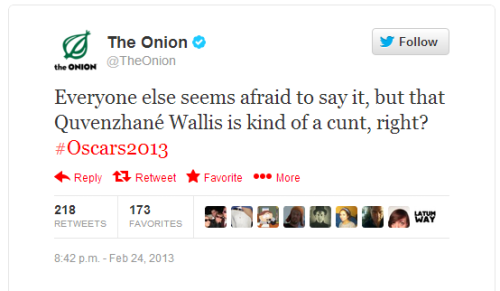Given that the turnaround for commentary on award shows is now, like, 12 hours, this is at least several days late. So, I apologize for my tardiness.
1. The Seth MacFarlane controversy
Seth MacFarlane was pretty awful, but I don't really have to tell you that. Instead, I can point you in the direction of a few links: you can find a list of sexist jokes here, a description of the sexism fatigue that sets in when one finds him/herself constantly fighting against defenses of sexism, and another perspective that didn't think the jokes were particularly bad but found MacFarlane's reduction of Halle Berry to merely a "beautiful woman" insulting. What emerges, even though many of the articles disagree over the specifics, is a general agreement about the "banality of sexism".
Because the problem isn't any one individual joke or comment that came from MacFarlane, which, in their isolation, might very well have seemed funny. The problem was 1) an unceasing barrage of mean-spirited jokes about women and 2) the relative absence of gendered jokes at the expense of men. And what that contributes to is a feeling that this kind of differential is simply normal. And if it seems like it's not a big deal, that's only because we're numb to what the jokes and comments actually mean. To wit, if we don't think it's problematic to describe Halle Berry only in terms of her beauty, rather than her talent, that's because we're entirely too accustomed to valuing women for their beauty, and only their beauty. It might be a compliment, but it's effectively a back-handed one.
2. The Onion controversy
This got less attention. The Onion was live-tweeting the Oscars, and this was one of those tweets:
Quvenzhané Wallis, if you didn't follow the show or watch Beasts of the Southern Wild, is a 9 year-old, and the reaction to the joke was so very swift and very negative that the Onion quickly pulled the tweet and apologized.
The thing is... I actually think this joke is hilarious. For one, the Onion isn't Seth MacFarlane - who made his own joke about Wallis, a worse one, that implied she was nearly old enough for George Clooney to date - and they have substantially more cred when it comes to gender-based humor. For another, the joke is both good satire (this is exactly the kind of crap that tabloids actually write...) and hilariously absurd (...but it's also the basest, most extreme version of that same tabloid crap). The joke works because no one would say that this 9 year-old girl is a "cunt".
And the joke also works because it isn't actually about Wallis - it's actually about the vacuity and mean-spiritedness of entertainment journalism and, more generally, the sort of people who thoughtlessly slap these sorts of misogynist labels on all women. This is also why MacFarlane's jokes are bad - he finds humor in victimization and oppression (see: his Rhianna and Chris Brown joke) rather than poking fun at the oppressors. (Admittedly, this is where the Wallis joke is shakiest. It could be read as making fun of her, certainly. But the best jokes also have to walk that sort of delicate line.)
And, as such, it actually does a pretty effective job of peeling back that layer of banality that insulates discourses of sexism. This might very well be something that no one would say, but it sounds suspiciously similar to things that people say all the time.
Now, admittedly, this is a pretty meta-level justification. And if people find this distasteful and unacceptable, I get it. But that's also kinda the point. Good satire scores political points by way of establishing its similarity to something real that's different in degree, not type. So, if you can't buy into the sexism of this joke, you shouldn't buy into the sexism that underlies those other jokes. That is, you should be able to see that the problem isn't how the Onion called this 9 year-old a "cunt" - the problem is that we think it's cool to call anyone a "cunt". Or sing about their boobs. Or how they had to develop eating disorders in order to fit into their dresses.

